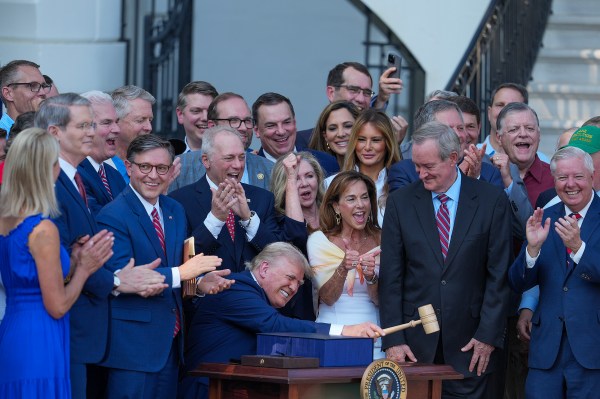Now that Congress has passed, and President Donald Trump has signed, the One Big Beautiful Bill Act (BBB), the die has been cast: Democrats desperate to claw back some level of power in Washington will be using this signature legislation against the GOP in next year’s midterms. Some Republicans in Washington, like Rep. Don Bacon and Sen. Thom Tillis, are already heading for the exits while warning that the Big Beautiful Bill is a ticking time bomb for the GOP. Democrats are eating it up.
“We’re just going to try to get the message out to the country about what’s in this monstrosity of a bill, and we could do no better than to quote the Republicans who’ve said they’d rather leave politics than to have anything to do with it,” Rep. Jamie Raskin, a Maryland Democrat, recently told the Washington Post.
But will Democrats be able to successfully argue that Trump’s big legislative win isn’t what Americans voted for and Washington needs a change? Will the tortured machinations to pass the BBB be worth it, serving as an affirmation that Republicans have delivered on their promises and deserve to maintain or even grow their power? Or will the 2026 congressional elections be driven by factors having little to do with this monstrosity of a bill?
History can be our guide as we speculate about how the next 15 months might play out. Here are a few potential scenarios with historical analogues to consider.
It’s possible that American voters receive the BBB just as Trump and congressional Republicans hope. With Congress having given its stamp of approval to the Trump agenda, the president can continue to implement his raft of campaign promises. The tax cuts from Trump’s first term have been happily extended; the president’s top priorities, such as immigration enforcement and defense, are funded and will be popular; the cuts to wasteful spending will be welcomed as responsible.
Under this scenario, there will be much rejoicing, and Republicans will be rewarded for passing the BBB by winning bigger majorities in the House and Senate. While not impossible, the likelihood of things playing out so swimmingly for Trump and the GOP seems low. Initial polling of public opinion of the bill, as CNN’s Harry Enten noted last week, is “terrible, terrible, terrible.” But Americans are also unfamiliar with the full extent of what’s contained in it, and while pluralities opposed it before it was passed, Americans could learn more, change their minds, and extend or even expand the Republican Party’s hold on the federal government.
It’s hard to find an exact parallel in recent political history, with the closest being the 2002 midterms in which Republicans won control of the Senate and increased their majority in the House at a time when they already had the White House. But that unusual election was not much of an affirmation of President George W. Bush’s middling domestic agenda as a reflection of voters approving his response to the 9/11 terrorist attacks a year earlier.
A more precise equivalent in 2026, then, would be that some exogenous event upends the country’s priorities and pushes the memory of the BBB aside. A midterm election in which voters are focused on something related to our foreign policy or national security, and for which Trump demonstrates competence, could very well deliver a Bush-era boost for his party—but giving credit to the BBB will be a bit of a stretch.
On the other side of the spectrum is a scenario that feckless Democratic bigwigs have been dreaming would deliver them from the post-Biden wilderness: Voters render a harsh verdict on the GOP for the new law, rebuking the president in a wave election that sets back Republicans for years and ushers in a new period of Democratic dominance. Apathetic Democratic voters, shellshocked by a second Trump term, will be motivated by how the law provides for countless Trump policies they hate, from deportation to defunding Planned Parenthood to the DOGE government-cutting project.
Meanwhile, the law will split the Republican coalition. There’s already plenty of conservative fury at the fiscal irresponsibility of the BBB’s spending provisions. The simmering outrage over the new law’s cuts to Medicaid could boil over, even leaving members of Trump’s downscale Republican base eager to throw out their party’s elected officials in protest. Trump’s overall negative approval rating will be compounded by the unpopularity of his signature law and transfer to the congressional Republican majorities that helped pass it. Democrats will be back in power before we know it.
This possible timeline is an especially familiar tale during our age of closely divided politics. All the heavy lifting necessary to muscle big legislation through Congress—the arm-twisting, the kickbacks and buy-offs, the hardball demands that endangered members vote with the party while risking their own reelection—creates openings for the minority to make a sustained case against the majority. Call it political jiu-jitsu, when an out-party can use the force of the in-party’s successes against them.
The perfect example is the Tea Party election in 2010, when Republicans successfully campaigned against a trifecta of President Barack Obama’s legislative priorities: the American Recovery and Reinvestment Act, the Affordable Care Act (both of which Obama signed into law), and the American Clean Energy and Security Act, which passed the House but not the Senate. Each had its own pithy nickname—the stimulus, Obamacare, and cap-and-trade—that became bywords for liberal excess and government overreach as the legislation grew increasingly unpopular. By Election Day 2010, the question wasn’t whether it would be a GOP wave but how high that wave would crest. (The final tally: House Democrats lost 63 seats, including 52 incumbents and several more who retired rather than face the angry voters. Democrats retained control of the Senate but Republicans netted six seats in the upper chamber.)
Democrats today would love nothing more than to see this dynamic repeat itself in 2026, but plenty of factors present then are missing now, not the least of which is the dearth of genuinely competitive House districts. And despite its massive price tag, the BBB does not implement sweeping changes to a major aspect of American life in the way, say, Obamacare did. Congress, too, matters far less now than it did a decade and a half ago as the executive branch continues to seize more power and the legislative branch willingly gives it up. Why should swing voters care too much about who their member of Congress is when government is by, of, and for the executive action?
The likeliest scenario is somewhere in the middle between the two parties’ fantasies: perhaps a significant repudiation of Trump and the GOP that has something, but not everything, to do with the BBB, or an underwhelming pushback that reflects some limited frustration with Republicans but not enough to hand over much power to Democrats.
For the former, think of the impressive performance of House Democratic candidates in 2018, who won a majority not by running against Trump’s fairly popular tax cuts but by raising the specter that Republicans would keep trying to undercut the health care system after failing to pass their partial repeal of Obamacare. The 2018 midterms were also driven by a sense of buyer’s remorse over Trump among suburban voters, meaning the elections were more of a referendum on the president than about what had happened on Capitol Hill.
For the latter, consider the 2022 midterm elections, when Republicans thought they might ride back into power by tying inflation and economic worries to the large spending packages (one of which was ironically titled the Inflation Reduction Act) passed by a Democratic Congress and signed by President Joe Biden. But the message didn’t seem to land cleanly. The GOP won just a handful of House seats to take a narrow majority and actually had a net loss in both Senate races and gubernatorial races. The Supreme Court overturning Roe v. Wade and upending the nation’s longstanding status quo on abortion a few months before the election tempered whatever gains Republicans might have made with voters disillusioned by Biden.
Ten years into his political career, Trump’s ability to offend and scandalize is diminished but not gone, and between his tough deportation policies and drastic tariff actions, it’s not hard to see how exhaustion with Trump redounds to Democrats’ benefit—and the BBB may well be a part of that. But Democrats might also brace themselves to be disappointed if their strategy amounts to running against Trump’s big bill without a clear argument for why it’s made most Americans’ lives worse.
Prepare for Americans to react to the BBB with a big ol’ “Meh.”










Please note that we at The Dispatch hold ourselves, our work, and our commenters to a higher standard than other places on the internet. We welcome comments that foster genuine debate or discussion—including comments critical of us or our work—but responses that include ad hominem attacks on fellow Dispatch members or are intended to stoke fear and anger may be moderated.
With your membership, you only have the ability to comment on The Morning Dispatch articles. Consider upgrading to join the conversation everywhere.